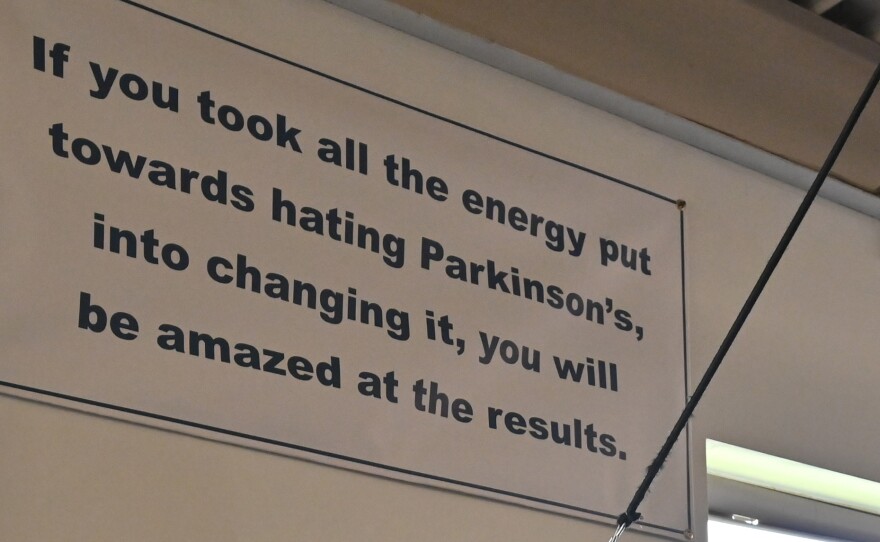Bill West received a Parkinson’s disease diagnosis about three years ago.
His daughter Kristy Karluk was scared of what the diagnosis meant for her father’s health. She moved home from West Virginia to be closer to him. She also encouraged him to join a local gym that specializes in boxing classes for people living with Parkinson’s disease.
“Watching him, I mean, he's starting to slow down a little bit, but he's also getting going because of the gym,” Karluk said. “The gym is what helps him go. When we miss a day or two, it's definitely noticeable.”
Karluk volunteers at the gym, assisting her father and other class participants at the Rock Steady Boxing of Northeast Pennsylvania gym in Old Forge. Seventy-five-year-old West sees a difference in himself from the early days of his diagnosis to now.
“My stability and my balance were really bad, and coming here has helped out a lot,” West said. “I don't shake so much, but my stability and my balance are really bad, and by coming here, it's helped me a lot, as far as strength-wise, in my legs and everything.”

Rock Steady Boxing of Northeast Pennsylvania
West is one of about 90 boxing students between the organization’s Tunkhannock and Old Forge locations. Kathy Reap, the owner and head coach of the gyms, welcomes people at any stage of their Parkinson’s diagnosis to give the classes a try.
“Everyone who comes to Rock Steady Boxing has Parkinson's,” Reap said. “We think we can accommodate every level of Parkinson's. Our classes are divided not necessarily by how long you've had Parkinson's or how old you are. It's how well you're able to physically participate in a class so that you're working in a class of your peers, where I can challenge you, yet keep you safe.”
Reap offers independent, quicker-moving classes, slower classes with more rests and assistance and seated classes.
The Old Forge gym offers three classes a week for $100 a month, while the Tunkhannock gym offers two classes for $80 a month.
There are more than 800 Rock Steady Boxing affiliate gyms across the country. Scott C. Newman started the program in 2006 in Indianapolis, Indiana, after being diagnosed with Parkinson's disease at 40 years old.
Reap also started her affiliate gyms for personal reasons- her husband received a Parkinson’s diagnosis in 2015. Being a physical therapist, she understood the importance of exercise.
She credits the boxing classes with his health.
“He's had symptoms for 11 years now,” Reap said. “We feel like he would be much more impaired if he wasn't working out here. The disease still does progress, so we do see some changes. He's still working his job. He still drives. His hobby is woodworking and painting, and he makes cornhole boards. He still gets down on the floor and is painting cornhole boards. Overall, for 11 years, that he's still doing all the same things is pretty good.”
On top of classes, Reap fosters a community. She offers outings, hosts a group conversation once a month in place of classes and encourages her students to grab lunch after classes. She also focuses on the neurological side of the disease.
“We also incorporate a program called Parkinson's Wellness Recovery,” she said. “Parkinson's Wellness Recovery is a certified program that the physical therapist can use, but also fitness instructors can use it in group fitness that targets all the neurological areas of Parkinson's.”
Slowing the progression of Parkinson's
Penn Medicine defines Parkinson’s disease as “a chronic degenerative movement disorder that causes problems with balance and control of movement.” It impacts men more than women.
About 1.1 million people in the U.S. live with Parkinson’s disease, according to the Parkinson’s Foundation. The organization notes that Parkinson’s is the second most common neurodegenerative disease after Alzheimer’s disease.
In Pennsylvania alone, that number is nearly 47,000 people living with the disease.
There is no cure for Parkinson’s. But exercise, according to the Journal of Neurology, Neurosurgery & Psychiatry, can slow the disease’s progression.
Reap wants to help people improve their quality of life and manage their disease symptoms better.
“Some of the benefits that [students have] expressed to me is having increased energy and endurance, which is really important for them. They feel steadier on their feet. They are able to move easier. A lot of them say they think they would be a lot worse, that the disease would have progressed faster if they weren't here. So here, even if you stay about the same, that's winning, because you have a disease that's progressive,” Reap said.
Jeff Nichols has lived with Parkinson’s for around 20 years. The 69-year-old only started coming to Rock Steady classes about two years ago.
“It does help. It loosens me up. I'm not as rigid as I was,” Nichols said.

Judy Talerico joined the gym three years ago, about six months after she received her diagnosis.
“When I first started coming, I had a lot of energy. My energy has dwindled, but the exercise in the boxing keeps me going, and if I didn't come to the class, I'd be further down the road with Parkinson's,” Talerico said.
The 75-year-old said that at first, she did not know how to accept her diagnosis.
“I was just sitting on the couch becoming a couch potato, because I was upset that this happened, and I had to get it under control,” Talerico said.
Since joining the gym, she’s adopted a new attitude.
“I found out that there's more people like me. I'm not the only one. If you sit home, you just brood over it,” she said.
At 75-years-old, West never boxed before. Boxing gave him a newfound confidence.
“It helps mentally, absolutely physically, and you still stay in your daily routine, whereas if you didn't, with this stupid Parkinson's, it makes you feel like you don't want to do anything,” West said.
The importance of community in navigating Parkinson’s disease
Karluk feels closer to her father now that she volunteers and attends the classes with him.
“Everybody depends on her a lot. When she's not here, I hear about it,” West said.
Reap loves to see her students open up to each other.
“They love the camaraderie. There's the socialization aspect, feeling like they're not alone. We make it fun. Not everybody likes to exercise. And if this is the solution for your disease, because your disease doesn't have a cure, most people will come here,” Reap said.
She often hears from students’ partners about the positive changes.
“One of the things I hear is they had stopped wanting to do things, going out to a restaurant, going to church, being with friends, that being here increases their confidence. They want to get out and do things again, because Parkinson's can be very isolating, so it has helped a lot in those areas as well,” she said.
West finds it easier to manage his own symptoms now that he has a community to rely on.
“The friendships that you gain in here help you out a lot in understanding what's going on, because everybody else has the issues, and you get to be really close friends with a lot of people, and we talk a lot about the symptoms, and it really helps a lot. So the friendships that you gain here are phenomenal,” West said.
Reap ends each class with a group call and response chant to ensure her students take their confidence from class into their lives outside the gym.
“Repeat after me,” Reap shouted to the class.
“We’ve all come back to the tried and true. Our muscles ache; they feel like glue. Parkinson’s disease, we hope you’re ready. We’re coming after you with Rock Steady. Go Rock Steady,” the class chanted after Reap to close out class.
Editor's Note: Read more about Lackawanna College's football coach Mark Duda's recent Parkinson's diagnosis and his legendary career.















